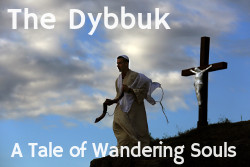"Conductor Paradox" - Description
The story told by popular actor Zdzisław Wardejn in the film by Michał Dudziewicz, happened during the Poznań 1956 uprising. That was when Kazimierz Wieczorek died. A tram conductor in whom Zdzisław Wardejn’s mother recognized her own... son.
Shown on the picture are main character of the film Zdzisław Wardejn and director Michał Dudziewicz on the film set.
TVP 2 (second channel of public polish TV) showed the documentary by Michał Dudziewicz “Conductor Paradox”. Well known actor Zdzisław Wardejn tells a story from his life. During the Poznań 1956 protests, 16 at that time, he was found dead, recognized by his mother and... almost buried. In the coffin ordered by his family the remains of a tram conductor were placed. And the circumstances of this man’s death are the real subject of Dudziewicz’s film. This is first film about the events of Poznań June in which no crowds were shown, and the iconography was economical - imagination awakened by the actor-narrator was supposed to take it over. You have to be really lucky, like Dudziewicz, to get such a nibble. Such a story, and told by a professional! You have to be even luckier, like Wardejn, to survive your own death. Wardejn didn’t act as himself, he was himself to such an extent, that during the film he was me, you, us. That is rare. These few days from boy’s life, from the life of a city, society have not been reviewed. Dudziewicz reminds of it without journalistic pushiness. I thank Wardejn for not selling his life to be used for political games. To director – praise be! The television has shown what it could have been. Because of the time of airing people responsible for setting airing hours may feel called by me with the words commonly considered insulting. I kindly ask the Lord to repeat the film during daytime!!!
Jerzy Diatłowicki, "Życie", 28-29 June 1997
A double life of Zdzisław Wardejn
Uncommon story about the events of Poznań June 1956 and complicated fate of people, who suddenly came to make history. – Everyone has his own life, but sometimes two lives intertwine – begins his memories Zdzisław Wardejn. In June 1956 the life of the now well known actor intertwined with the dramatic biography of a tram conductor Kazimierz Wieczorek. Zdzisław Wardejn was 16 by then, and had just finished second grade of technical school. – It was morning of June 28th – he recalls. – I was going to go to a training with my friend. We waited for a tram but it didn’t come.
Wardejn went to the station and came to a conclusion that something was happening in the city. The stands at the International Poznań Fare were being closed. Soon the militia started to arrest people. Among the arrested was also Zdzisław Wardejn. On that Thursday a lot begun in Poznań. After 10 am demonstrators from Cegielski Factories (former Stalin Metal Industries) marched towards the city center. The crowd had gathered in front of the Communist Party Headquarters, but the Secretary of the Regional Committee didn’t appear. Through a megaphone someone shouted: “To Młyńska Street!”. That was where the prison was situated. The crowd set off. Among the demonstrators was tram conductor Kazimierz Wieczorek. Around 3 pm Wieczorek was lightly wounded and he was taken to a hospital. The gunshot wound wasn’t serious. Wieczorek released from the hospital and shoot dead. The day after that mother of Zdzisław Wardejn, who was looking for her missing son, identified as she thought his body in the mortuary among battered bandaged bodies. But before Zdzisław’s funeral, announced for 2nd July, took place the prisoner was released and he came home. It was a shock but at the same time joy for the family. Soon the agents in uniforms appeared and tried to whitewash the mistake.
The director Michał Dudziewicz invited to talk in front of the camera Zdzisław Wardejn and siblings of Kazimierz Wieczorek. He also referred to the documents. Following the traces of two complicated lives he tries to explain, why had the tram conductor Wieczorek been shot dead. The witnesses of the events from before 50 years are still alive – maybe they’ll answer that question.
- I’ve read a book by Aleksander Ziemkowski about the Poznań uprising in which there are featured memoirs of Zdzisław Wardejn’s mother. There is also an account of Kazimierz Wieczorek’s niece – says the director Michał Dudziewicz. – I was fascinated by the mystery surrounding the death of Kazimierz Wieczorek. Previously I got to know many documents, today again inaccessible, and I started to create a jigsaw puzzle: hour after hour, event after event. I asked Zdzisław Wardejn to tell his story. He agreed. In winter I wrote the script and in March we did the filming.
J.W.



















